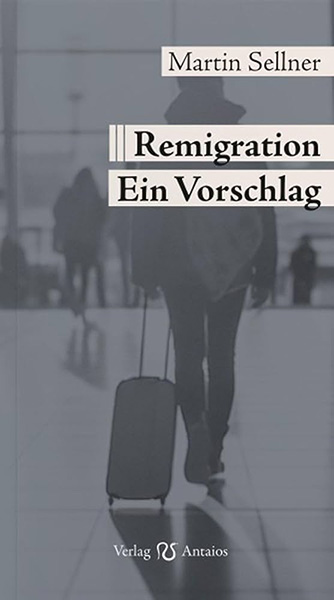Credit Image: © Ying Tang/NurPhoto via ZUMA Press
Subscribe to future audio versions of AmRen articles here.
Martin Sellner, Remigration: Ein Vorschlag (Remigration: A Proposal), Verlag Antaios, 2024, €20, 184 pages (available only in German)
In March, Austrian identitarian leader Martin Sellner was banned from Germany for three years. The same month, he gave a talk in the Swiss canton of Aargau when police barged in and handcuffed him. He was deported and banned from the canton also for three years. The justification for the bans in both countries was his dangerous ideas on “remigration,” which he explains in this book: a short, accessible, and admirably thorough treatment of one of the most important problems of our time.
February 23, 2024, Saxony, Chemnitz: A participant at a rally holds a sign reading ”Martin Sellner is welcome.” Sellner, a right-wing activist from Austria, was speaking at a demonstration organized by the Identitarian Movement. (Credit Image: © Sebastian Willnow/dpa via ZUMA Press)
The author calls the immigration to most Western nations “replacement migration.” The term comes from a 2000 UN policy paper, but the process began decades earlier. As Mr. Sellner puts it, “since the 1970s, population growth in Western Europe can be almost exclusively attributed to immigrants and their birth rates.”
After the Baby Boomers, each generation of native Germans, for example, has been smaller than the one before, while each generation of migrants has been larger. Mr. Sellner includes graphs from the Federal Statistical Office of Germany showing that “asylum seekers” are primarily men under the age of 40, while the median age of the native population is about 60. Some immigrants are pleased. Behzad Karim Khani, an Iranian, writes that “You are dying out, and . . . we migrants will surely inherit this country.”
Not only do immigrants have an advantage in youth and fertility, many have become citizens and can vote. Mr. Sellner estimates that there are 5 million “Germans” of non-European origin, of which 3 million are Muslims. They tend to support politicians who promise more immigration. Germans could therefore become a minority and, as Mr. Sellner notes, “lose the right of self-determination in their own country.”
Although economics are widely used to justify mass immigration, Mr. Sellner argues that moral convictions play a larger role. The Western world now belongs to a “cult of guilt” that teaches us to remember our collective sins and constantly do penance for them. In Germany, the most important aspect of this is universal “Holocaust education,” to the point that the national identity is now based on “deep historical shame.” Replacement migration is often explicitly justified as “atonement.” If it harms the native population, so much the better.
The most immediately obvious damage includes higher crime rates, Islamic terrorism, and the strain on public services. No fewer than 2.6 million non-citizens get unemployment benefits. Mr. Sellner argues that it is becoming socially acceptable to criticize these consequences of immigration, but not their cause. Diversity means not only more crime, but many other consequences of low trust: corruption, welfare fraud, loss of faith in democratic institutions, and lack of identity within the broader society. Europeans are losing their high-trust societies to migration.
Mr. Sellner writes that immigration should not be atonement, but should benefit Germans. It should reduce Überfremdung — the feeling of being overwhelmed by foreigners in one’s own country — and support German culture. Some immigration could be allowed, but much less, and with high standards. Foreigners’ desires for a better life are understandable, but do not outweigh the interests of Germans.
Stars, moons, and the words ”Happy Ramadan” light up Frankfurt’s Fressgass, March 10, 2024. (Credit Image: © Frank Rumpenhorst/dpa via ZUMA Press)
Mr. Sellner draws a distinction between integration and assimilation. Those who are integrated have jobs, obey the law, and speak German, but do not necessarily identify as German. Those who are assimilated think of themselves as Germans, and most of their friends are no longer from the home country. An immigrant is not truly assimilated until natives see him as one of their own. Some integrated but unassimilated immigrants can be tolerated.
In Mr. Sellner’s view, the truly assimilated could become citizens, but only at the end of a demanding “assimilation course.” They would have to demonstrate excellent knowledge of German language and culture, an above-average contribution to the economy, and show no signs of extremism. Only those who had lived in the country for 15 years without interruption (seven years for white immigrants) could become citizens. Finally, they would take an oath of loyalty to Germany, its people, and its constitution. Even those who have been naturalized could have citizenship revoked if, for example, they joined extremist groups.
Of least concern are white immigrants, who are usually integrated, if not always assimilated. They account for at least 6 million citizens, and at least 6 million more non-citizens. Culturally, they are relatively close to Germans. They vote differently from natives only in that they are somewhat more likely to support the AfD. Most have low crime rates, their birth rates are like those of Germans, and they do not burden public services. They do not start chain migration, because they do not have many poor relatives in their home countries, and those countries are safe. Even with no change in policy, Mr. Sellner would expect their numbers to decrease due to easy assimilation, low birth rates, and voluntary remigration.
AfD information event at the Hamburg town hall, Hamburg, Germany, February 29, 2024. (Credit Image: © Nibor/Action Press via ZUMA Press)
Mr. Sellner says there are “historically developed ethnic minorities,” which should be left alone even if they are unassimilated. These include Danes, Sorbs (a minority that lives in the former East Germany), Frisians and — surprisingly — the Sinti and Roma (gypsies). He writes that “stable nations can only develop” when these groups have “a certain kinship and compatibility with the majority society.” It is hard to imagine why he thinks gypsies are compatible with, let alone related to, Germans.
Germany also has East Asian immigrants. These are integrated, with little crime or unemployment, though many live in insular neighborhoods and do not assimilate. There is good reason to prevent more Asian enclaves; even peaceful foreigners can contribute to Überfremdung. Further, if there were ever conflict between Japan and Korea, for example, strong ethnic identities could disturb the peace in Germany.
The worst immigrants are from African and Muslim countries, who tend to form “parallel societies,” but even they should be given a chance to assimilate. Few should be let in, and many encouraged to leave. Mr. Sellner calls for a new research institute that would calculate the economic, criminal, and cultural stress put on society by immigrants, with data collected for each nationality. This would set immigration limits for each nation. In the meantime, Mr. Sellner proposes a moratorium on African and Muslim immigration.
Dutch data show how different immigrants can be. Researcher Geritt Kreffer found that those from the US, Britain, Oceania, Scandinavia, Switzerland, and Japan made the biggest lifetime per-capita contribution (€200,000), while those from Morocco (€550,000) and the Horn of Africa and South Sudan cost the most (€600,000).
Mr. Sellner suggests many ways to encourage migrants to return home. He would tax remittances and fine employers that hire illegals. Much of the earnings of seasonal workers could be withheld, and not paid until the workers went home. Public benefits should be paid in goods and services rather than cash and, when possible, at the level available in migrants’ home countries. Mr. Sellner proposes eliminating all anti-discrimination regulations, which now govern everything from hiring and housing to admission to bars. Foreigners would be banned from political activity against the interests of Germans, which Mr. Sellner argues would only mean enforcing existing laws.
Martin Sellner (Credit Image: © Imago via ZUMA Press)
As for Islam, a group of experts would establish a new “secular” form of Islam. Imams would be required to preach in German, and the authorities would monitor the content of sermons. Imams and schoolteachers who did not teach “acceptable” Islam would be prosecuted. As Mr. Sellner notes, this would be like the status Christians have in Muslim countries, but such policies would probably be thrown out by courts as a violation of religious freedom.
Illegal immigrants and people who refuse to leave after their visas expire must be deported. Non-citizen criminals would be immediately returned to home countries and barred for life from returning. At present, even unassimilated citizens can only rarely have their citizenship stripped, but Mr. Sellner would make this automatic for serious crimes. This is not a radical proposal. Peter Beuth, interior minister of the German state of Hessen, has already called for members of criminal gangs to have their citizenship revoked, and German interior minister Nancy Faeser has suggested making it possible to deport clan members en masse, even those not convicted of crimes.
Most “asylum-seekers” are bogus. Article 16a of the German constitution permits a right to asylum only for those fleeing state persecution. Further, refugees are expected to claim asylum in the first safe country they reach, and Germany is surrounded by safe countries. Most of the estimated 3.5 million current “refugees” have come for economic reasons, but because claims processing can go on indefinitely, they effectively get permanent residency. Mr. Sellner would legally dismantle the “asylum industry,” including the NGOs that help run it. Anyone who makes a false asylum claim would be deported.
Asylum policies originate partly from European Union laws, so they must be changed. Germany is a net contributor to the EU and should have a great deal of clout. If the EU tries to compel Germany to continue with the Great Replacement, he suggests it could threaten to leave or cut off payments. Asylum policy is also based on treaties such as the European Human Rights Convention; Germany can withdraw unilaterally.
Mr. Sellner makes clear that no one would be deported, stripped of citizenship, or given second-class status based exclusively on ethnicity or culture. First, it would violate the German constitution, which guarantees equality under the law. Second, such treatment would serve as a precedent for any future government to disenfranchise any disfavored group, and this might lead to loss of faith in the system and even civil war. Remigration policy would judge individuals on their respect for law, willingness to assimilate, and ability to contribute.
Remigration centers would be established in migrant neighborhoods to offer job training and help find jobs and housing in home countries. Remigrants would get €30–50 thousand, to be paid after they left; the greater the burden, the larger the payment.
One of Mr. Sellner’s most ambitious ideas is to build a new city on the northern coast of Africa. This “model city” would house remigrants who, for whatever reason, cannot be returned to home countries, and would also be where applications for asylum would be processed. Such a place would theoretically be fertile ground for commerce and development, thanks to tax breaks and loans.
Unfortunately, even with a broad remigration program, Mr. Sellner estimates it could take as long as 15 years for “parallel societies” to stop growing, and 30 years before such enclaves disappeared or “declined to a tolerable level.” He estimates that at most 9.5 million people would need to leave, including 3.5 million refugees, 4 million other non-citizens, and 2 million unassimilated citizens. However, as he puts it, his generation could live to see Germany become more German every day.
German symbols such as the flag should be conspicuous in public spaces. Foreign flags and wearing veils in public should be banned. The authorities should recognize no foreign holidays or dietary customs, and government should stop “celebrating diversity.” The message would be unequivocal: Germany belongs to the Germans.
Surprisingly, even though Mr. Sellner is considered a dangerous thought criminal, and has been censured, deplatformed, and debanked many times, his new book is on Amazon Germany where, after a month and a half, it is at a respectable 21st place in the political science category. Fully 65 percent of its 132 reviews are five-star and almost all the rest are one-star. Most of the low ratings are idiotic name-calling: “inhumane,” “rubbish,” “twisted,” “brown crap,” “fascist,” etc. According to this article, the book was so popular before it was released that pre-orders pushed it to Amazon Germany’s number-one position.
Amazon also sells a free audio book by a lefty “that uncovers . . . the explosive core of his [Sellner’s] messages” and “details the secret goals of the Identitarian Movement.” And yet, the book is surprisingly sympathetic, noting that Mr. Sellner has been treated outrageously and even admitting that people are more comfortable around people like themselves.
In Germany, as in the rest of the West, the Great Replacement should be the central political question. It is a result of government policy and can be reversed by government policy. The state has an obligation to defend its people’s interests, not to feed and house the whole world. Remigration is practical, moral, and necessary, and Martin Sellner has made an invaluable contribution to our understanding of what must be done to save our civilization.
[Editor’s Note: Mr. Sellner will address this year’s American Renaissance conference, to be held November 15–17.]





